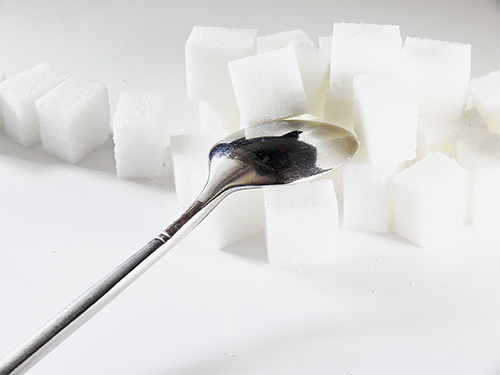Americans are consuming a lot of added sugar, around 89 grams per day. That’s two to three times the amount recommended by the American Heart Association, who advises women to consume no more than 25 grams of added sugar per day and men no more than 36 grams per day. To put that into perspective, one teaspoon equals four grams of sugar. There’s a reason health professionals across the country are working hard to raise awareness about the dangers of added sugar, and even governments are stepping in to curb sugar consumption by imposing a “soda tax” on sugary drinks: Sugar is bad news for a healthy diet, and sometimes can be downright deadly.
Why is added sugar so dangerous?
“Sugar comes up daily with my patients,” says Dr. Chung-Kay Koh, an endocrinologist at Advocate Lutheran General. “When we can’t use sugars, our body turns them into fats, which clog our arteries and become belly fat.”
Those extra calories that come with added sugar, which lurks everywhere from the obvious desserts and baked goods to the sneakier sources like salad dressings and barbecue sauces, contribute to obesity. Obesity can increase an individual’s risk of type 2 diabetes and heart disease as well as many different kinds of cancer.
“Data suggests half of Americans aren’t aware of the link between obesity and cancer, but obesity is connected to 13 different kinds of cancer. One third of the most common cancers can be prevented with lifestyle changes, including weight loss,” says Carolyn Lammersfeld, vice president of integrative medicine at Cancer Treatment Centers of America and author of “Cancer Nutrition & Recipes for Dummies.”
Should you cut sugar out completely?
Those with a sweet tooth can exhale with relief, because cutting out all added sugar isn’t necessary.
“You don’t need to completely eliminate added sugar, but you do need to moderate your consumption of it,” says Lammersfeld. Koh agrees, particularly in light of how prevalent sugar is in the American diet.
How to reduce added sugar in your diet
There are many ways that you can reduce your intake of added sugar. Lammersfeld developed a multifaceted approach that she defines with the acronym SLASH:
- Stay in for meals instead of eating out.
- Look at labels.
- Alternate sugar sources by making your own condiments and sauces without added sugar.
- Sweeten yourself, meaning buy unsweetened products and sweeten them yourself to use less.
- Hydrate with water and rethink what you drink.
“Start by making small changes,” suggests Lammersfeld.
Lynn Tucker, registered dietician at NorthShore University HealthSystem, notes that knowing yourself is instrumental when it comes to making any significant changes to your diet, especially how much sugar you consume. “For some people, quitting sugar cold turkey is a good thing. There are those for whom moderation doesn’t work well. For other people, though, restricting it all together is bad because then they do the opposite and have a ton of sugar. You have to know yourself and know if you can eat just one, or if eating one leads to eating more,” she says.
She recommends going through the food in your pantry, examining the labels to determine sugar content, and getting rid of the worst offenders. She notes that ingredients are listed by weight, and often sugars, high-fructose corn syrup, cane syrup and other are listed near the top. Pay attention to items like breakfast cereal and granola bars, which are often loaded with hidden sugar.
Another tip from Tucker is to purchase sweets at a bakery instead of buying a box of cookies from the grocery store. This makes portion control easier as you’re more likely to purchase just one.

Beware of beverages
Many people making the effort to reduce sugar focus on food, but don’t forget about drinks. The largest contributors of added sugar and calories to the American diet are sugar-sweetened beverages, according to the U.S. Centers for Disease Control. In 1965, the number of calories from beverages accounted for 11 percent of calories consumed among adults in the U.S. In 2002, they accounted for 21 percent of calories consumed, according to a study in the journal Obesity.
“Beverages can be some of the worst offenders for added sugars. That’s the first thing to go when you’re trying to reduce sugar,” says Tucker, who cautions that even drinks that appear healthy, like vitamin water, have a lot of added sugar. Lammersfeld suggests trying to cut back the number of sodas one consumes each day or, instead of drinking the 20-ounce option, go for the 12- or 8-ounce option. Instead of a sugar-laden drink at the coffee shop, try a black coffee or tea.
Being aware of what constitutes added sugar is also important. Corn syrup in its various forms is an added sugar, as are many ingredients ending in “-ose.” Tucker cautions that natural items can still be used as added sugars, including fruit juice concentrates, honey and maple syrup.
What about natural sugar in fruit?
Some popular diet plans eschew fruit given that it is high in natural sugar, but such a step may not be necessary.
“Fruit has sugar in it, but you’re also getting vitamins, minerals, fiber and phytochemicals that are good for your health,” says Tucker. The fiber in fruit helps you feel full longer.
Like everything, moderation is key, and the experts advise that while fruit certainly has a place in a healthy diet, eating excessive amounts of it, or anything, really, is not advisable.
What about eating out?
While eating in is one of the best ways to control the amount of sugar you consume, there are strategies you can use when eating out to keep added sugar in check. “When eating out, failing to plan is planning to fail,” says Lammersfeld. “Do research ahead of time so you go in knowing the best choices.” She notes that many restaurants have their menus — some even with nutritional information — online so it’s easy to do advance research.
In addition to planning ahead, other practical tips include:
- Ask for toppings and sauces on the side.
- If dessert is part of a celebration, share one serving with someone else.
- Use oil and vinegar in place of other salad dressings.
- Stick with mustard as a condiment instead of those that often have high sugar content, like ketchup and BBQ sauce.
- Drink water, sparkling water or unsweetened tea.
- Watch your portion size.
Labeling matters
The Food and Drug Administration (FDA) has approved a change in food labels that includes a separate line stating the amount of added sugar. The change will take effect in July 2018.
“Right now, it’s hard to distinguish between natural and added sugar, and it’s not reasonable to expect people to put a lot of thought into it,” says Lammersfeld.
While it’s a step in the right direction, Koh wonders if the label changes will be enough information for people to significantly reduce added sugar given how ubiquitous it is.
Artificial sweeteners
While they don’t have the calories of sugar, artificial sweeteners should also be avoided. “They continue to increase the desire for sweet foods, which is a problem,” cautions Koh. Moreover, Lammersfeld says the data suggests that artificial sweeteners don’t necessarily help people trying to lose weight and may impact the gut biome in ways that are not helpful.
What are the results of reducing added sugar?
“It’s difficult to stop craving sugar,” says Koh. But the good news is that it is not only possible, but it also may get easier over time. As people consume less sugar, often their taste buds will change. After a bit of time away from them, processed foods start to taste too sweet, as David Leonhart noted in his article “A Month Without Sugar” in the New York Times.
While people reducing their added sugar intake may initially feel sluggish, in the long term they often find that they have more energy, sleep better, have better blood sugar levels and may also lose weight. Koh also says patients report feeling that their mind is sharper.
“Data suggests that in the long term [reducing added sugar] reduces the risk of chronic diseases, and losing weight means less risk for 13 cancers,” says Lammersfeld.
For someone considering reducing sugar, Koh says, “Think about the positives associated with cutting out the added sugar. They are significant.” The health benefits that come from limiting sugar can be sweet in their own right.
More from Make It Better:
- Row With It: The Incredible Benefits of Rowing
- How Can You Be Sure Your Family’s Drinking Water is Safe?
- How to Keep Mosquitoes Away From Your Yard All Summer Long

Shannan Younger is a writer living in the western suburbs of Chicago with her husband and teen daughter. Originally from Ohio, she received her undergraduate and law degrees from the University of Notre Dame. Her essays have been published in several anthologies and her work has been featured on a wide range of websites, from the Erma Bombeck Humor Writers Workshop to the BBC. She also blogs about parenting at Between Us Parents.

